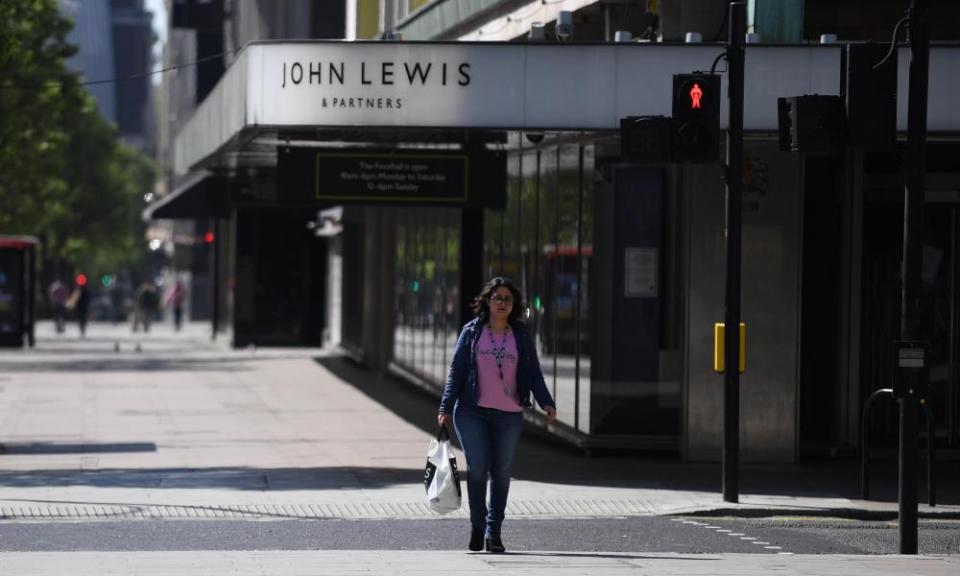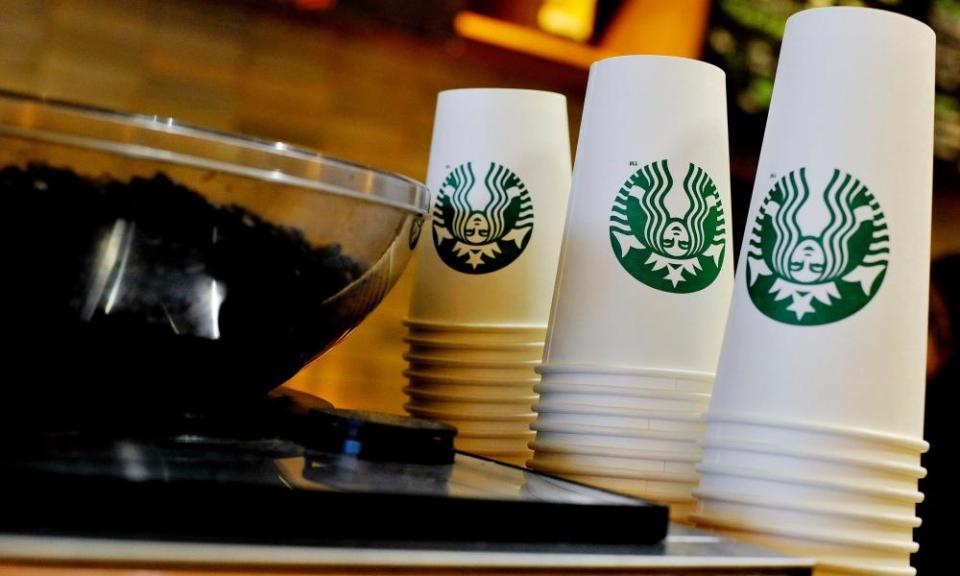Will shoppers return to the UK high street after lockdown?

Coronavirus has already triggered a wave of high street failures, from Oasis and Warehouse to Laura Ashley and Cath Kidston. Hundreds of thousands of retail workers have been furloughed, with the aim that they will return to the shop floor when stores are allowed to reopen.
But there are growing fears that the lockdown may prompt huge changes in the way we shop, ushering in an era of fewer shops, more home deliveries, more local shopping and changes in the way we buy fashion.
The temporary closure of the high street has “shaken people’s reality”, says retail analyst Richard Lim, adding that the situation has forced consumers to reassess how and what they buy: “Most people have no experience of this kind of disruption so it’s shaping their perception of what’s possible.”
Related: UK childcare industry 'crushed' by coronavirus crisis
British retailers were battle weary after 2019 which was their worst on record. Sales fell for the first time in 24 years as growth in online shopping failed to offset the downturn on the high street and shoppers spent spare cash on leisure and experiences rather than clothes and homewares.
It is estimated that the financial reckoning faced by the retail sector will result in 20,620 store closures this year – up from about 16,000 in 2019 – and trigger nearly 250,000 job losses, according to a new analysis based on a three-month lockdown by the Centre for Retail Research (CRR).
Prof Joshua Bamfield, the CRR’s director, said the coronavirus was a “hammer blow” for retailers: “We expect more companies to go into administration followed by the current pattern of an acquirer purchasing a small number of well-performing stores plus the brand names and the rest of the stores to remain unsold.”
The toll on jobs will be substantial. The demise of Laura Ashley and Cath Kidston alone has cost 3,000 jobs.
Britons were already enthusiastic online shoppers but retailers including the John Lewis and Curry’s PC World chains reported a near doubling of online sales since the quarantine began, and Bamfield predicts that rapid growth will continue, causing even “greater problems for bricks-and-mortar stores”.
This week Sharon White, the John Lewis group’s chairman, said the company feared sales at its department store chain could fall by a third this year despite increased sales through its website. The financial pressure created by the abrupt shutdown has already put Debenhams into administration for the second time in a year.
White, who had warned of looming store closures and job losses before the pandemic said she would now have to consider “changes in consumer behaviour to come out of the pandemic, such as a more pronounced shift to online and a desire to shop in more sustainable ways”.
Lim, who runs the consultancy firm Retail Economics, predicts the crisis will hasten changes already under way, resulting in half of all non-food spending moving online – up from around 30% today.
Before the pandemic, only 7% of groceries were bought online – though capacity has doubled in recent weeks – whereas half of all electricals and books were already bought on the web.
Lim says Covid-19 has forced shoppers who had never shopped on the internet to give it a try. “Sections of society are being forced to go on a customer journey they wouldn’t otherwise have embarked on. People who couldn’t be bothered to try online shopping are getting past the initial friction of setting up an online account and inputting their payment details.”
Lim also believes the enforced holiday from consumption could lead to reduced materialism. “Two decades of importing deflation from China means we have had price falls in retail categories like clothing and footwear,” he said. “Arguably we’ve got an abundance of material possessions and we attach less economic value to certain products.”
“The pause for reflection that consumers are making at the moment could lead to a reassessment of what’s important,” says Lim. “If I have sat here for the last three months and I haven’t bought a new pair of shoes or a handbag maybe it wasn’t as important as I thought it was?”
Consumers may need coaxing back to shopping centres with financial incentives and reassurances that it is safe. In China, the authorities have been giving away shopping vouchers to encourage shoppers back into the malls.
In Dubai, the reopening protocols for retailers include thermal scanners at mall entrances, time-limited shopping sprees and signs outside indicating when the safe limit of customers has been reached inside. Closer to home Curry’s intends to offer a “drive-through” service in its car parks for those who no longer want to linger.
Primark, which is losing £650m in sales for every month its stores remain closed, said this week that it expects shoppers to be cautious about returning. John Bason, finance director at Primark’s owner, Associated British Foods, said he didn’t “expect deserted high streets to just go bang” but that trade would build over time.
Diane Wehrle, insights director at Springboard which specialises in tracking shopper numbers, said that smaller high streets had hung on to more shoppers than bigger towns as people stayed local, but she does believe that shoppers will return to bigger towns and cities “if things work out and we don’t get a second rush of cases”.
Springboard is working on an occupancy alert service for centre owners so they can use technology to manage crowds and keep shoppers in the loop. “Malls will need to be able to track occupancy,” said Wehrle. Customers will be kept up to date via social media.
This week B&Q reopened 155 stores with “strict” safety measures that will make visiting a DIY retailer a chore even for the most avid enthusiast. Retailers such as John Lewis and Marks & Spencer will have a head start when the time comes to reopen as they have been able to use their food businesses to devise workable social distancing measures.
Shopping for pleasure seems a lifetime ago.
The future of shopping
Amid fears that some high street brands may be forced to close permanently under the UK lockdown, the Guardian asked readers about how they think their shopping habits may change after the lockdown ends.
Breaking the takeaway coffee habit

Andy Lee, 36, from Warrington, estimates he will save about £50 a month. “I was spending so much money in Starbucks,” said Lee, who works as a local government worker. “My other half and I have discovered Nespresso though, and are using around 15 capsules a day between us.”
“I can’t see myself going back to takeaway coffee but I miss not having meals out. It’s a bit embarrassing but the first thing I want to do after lockdown is get a McDonald’s.”
Sarah Crooks, who lives in the Peak District, will also be be giving up her takeaway coffee habit. “Before I must have bought up to 10 coffees a week, often accompanied by a biscuit, cake or a sandwich,’” said the lecturer ,who is in her mid-50s. “I did it so often that it was almost a reflex.
“Breaking the habit and saving so much money is one of the positive side-effects of all this.”
Fewer clothes – but more online
Sharanya Basu Roy, 29, an associate lecturer from Derby, said: “The lockdown has definitely made me less materialistic. I will be reducing my spending on eating out, clothing and fashion accessories. They are not environmentally sustainable and there are things in life that are more important.”
Anna Oldbury, 43, a food producer, from London. “I will definitely spend less on seasonal garments and fast fashion,” she said. “I’m not likely to shop on the high street anymore when you can buy it all online. However, I do still want to support independent shops and boutiques.”
Shopping locally
A 54-year-old reader from Buckhurst Hill, who preferred not to give her name, said she had a poor experience with one of the larger supermarkets getting deliveries organised for her elderly father, but that local retailers had helped.
“I understand it’s a terrible time but smaller companies have really stepped up to the mark and I’d rather support them. They’re also more likely to need our custom to survive this.”
Richard Stone, 43, a managing director of a PR consultancy firm from Stafford, said he would also be shopping and eating more locally. “Our local plastic-free supermarket has been delivering throughout the crisis and when it’s over I plan to use them even more.
“When the lockdown is over, I plan to visit all the local shops and restaurants I love, providing they’ve survived the pandemic – to help support them. I live in a small county town and if you don’t use it, you lose it, from a retail perspective.”

 Yahoo Finance
Yahoo Finance 